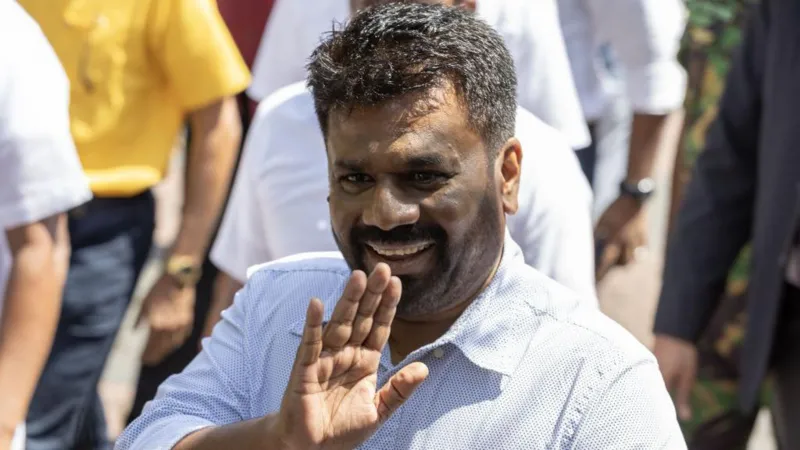Foreign
Sri Lanka swears in new left-leaning president

Sri Lanka’s new president Anura Kumara Dissanayake has been sworn into office, promising “clean” politics as the country recovers from its worst economic crisis.
The left-leaning Dissanayake has cast himself as a disruptor of the status quo, and analysts see his victory as a rejection of corruption and cronyism that has long plagued the country.
Saturday’s election was the first since 2022, when discontent over the economy fuelled mass protests and chased former president Gotabaya Rajapaksa from power.
“We need to establish a new clean political culture,” he said. “I commit to achieving this. We will do the utmost to win back the people’s respect and trust for the political system.”
The 55-year-old, also known as AKD, told Sri Lankans that “democracy doesn’t end with appointing a leader”.
“We need to strengthen democracy. I pledge to do my utmost to safeguard democracy,” he said.
“I have said before that I am not a magician – I am an ordinary citizen. There are things I know and don’t know. My utmost objective is to gather those with the knowledge and skills to help lift this country.”
Dissanayake received a Buddhist blessing at the end of his speech. Representatives of Sri Lanka’s other religions – Islam, Hinduism and Christianity – were also present during the oath-taking, highlighting the new president’s emphasis on diversity.
In a statement on the eve of the ceremony, Dissanayake said the “unity of Sinhalese, Tamils, Muslims and all Sri Lankans is the bedrock of this new beginning”.
During the campaign, Dissanayake promised voters good governance and tough anti-corruption measures.
He has promised to develop Sri Lanka’s manufacturing, agriculture and IT sectors. He has also committed to continuing the deal struck with the International Monetary Fund (IMF) to bail Sri Lanka out of the economic crisis while reducing the impact of its austerity measures on the country’s poorest.
Sri Lankan Prime Minister Dinesh Gunawardena resigned before Dissanayake was sworn in, paving the way for the dissolution of parliament.
In an earlier interview with BBC Sinhala, Dissanayake signalled that he would dissolve parliament soon after being elected.
“There is no point continuing with a parliament that is not in line with what the people want,” he said at the time.
Dissanayake won after the counting stretched into a second round on Sunday, as no candidate was able to win more than 50% of the total votes in the first round.
Once the second and third-choice votes for president had been tallied, the Election Commission said Dissanayake had won with a total of 5,740,179 votes.
Opposition leader Sajith Premadasa came in second at 4,530,902. Outgoing President Ranil Wickremesinghe got 2,299,767 during the first round of counting and was excluded from the second round.
Wickremesinghe congratulated his successor, saying: “With much love and respect for this beloved nation, I hand over its future to the new president”.
Until this weekend’s vote, all of Sri Lanka’s eight presidential elections since 1982 had seen the winner emerge during the first round of counting. This poll has been described as one of the closest in the country’s history.
Dissanayake’s anti-corruption platform resonated strongly with voters who have been clamouring for systematic change since the crisis.
This enabled him to overcome trepidation over the violent past of his political party, the Marxist Janatha Vimukthi Peramuna (JVP), which carried out two armed insurrections against the Sri Lankan state in the 1970s and 80s.
Dissanayake’s alliance, the National People’s Power – of which the JVP is a part – rose to prominence during the 2022 protests, known as the Aragalaya – Sinhala for struggle.
Dissanayake has also sought to moderate the hard-left stance of his party in more recent years.
Economic meltdown
The country’s new president will be faced with the twin tasks of reviving the economy and lifting millions from crushing poverty.
An economic meltdown fuelled the Aragalaya uprising that unseated Rajapaksa from the presidential palace in 2022.
At that time, Sri Lanka’s foreign currency reserves had dried up, leaving the country unable to import essentials such as fuel. Public debt ballooned to $83bn while inflation soared to 70%.
This made basics such as food and medicine unaffordable to ordinary people.
The country’s economic misery has been blamed on major policy errors, weak exports and years of under-taxation. This was exacerbated by the Covid-19 pandemic, which choked tourism, a key economic driver.
Many people have also blamed corruption and mismanagement, however, stoking anger against Rajapaksa and his family, who collectively ruled Sri Lanka for more than 10 years.
“The most serious challenge is how to restore this economy,” Dr Athulasiri Samarakoon, a political scientist at the Open University of Sri Lanka, told the BBC Sinhala Service.
During his term Wickremesinghe secured a $2.9bn lifeline from the International Monetary Fund (IMF), which is crucial to opening additional funding channels but comes with strict economic and governance policy reforms.
Sri Lanka is restructuring the terms of its debt payments with foreign and domestic lenders, as mandated by the IMF. The main focus has been the country’s $36bn worth of foreign debt, of which $7bn is owed to China, its largest bilateral creditor.
Like Dissanayake, Premadasa also pushed for IT development, as well as the establishment of 25 new industrial zones. He said tourism should be supported so that it becomes the country’s top foreign currency earner.
Wickremesinghe said during the campaign that he would double tourist arrivals and establish a national wealth fund, as well as new economic zones to increase growth.




![Anxiety as Arik Aircraft Engine Explodes Mid-Air [PHOTO]](https://thepapers.ng/wp-content/uploads/2026/01/breaking-news-80x80.jpg)







